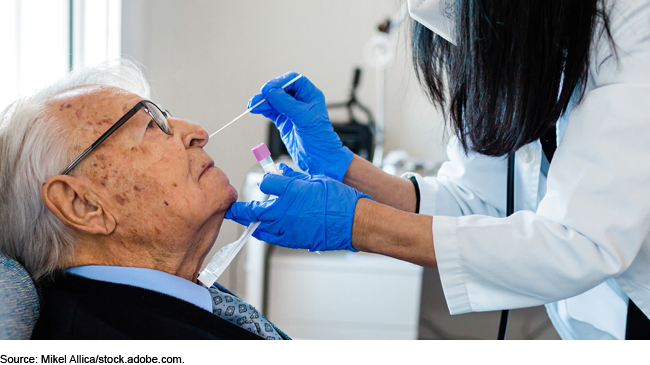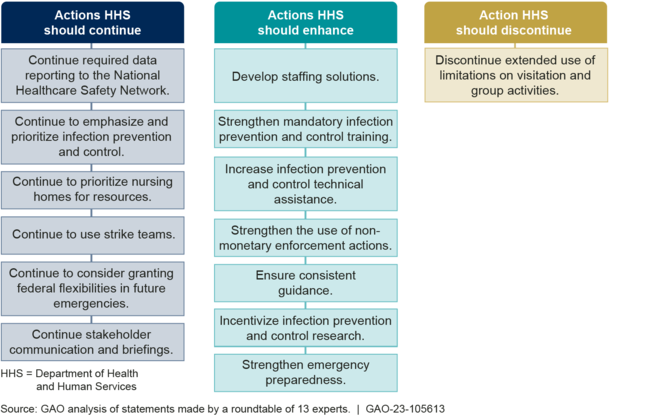COVID-19 in Nursing Homes: Experts Identified Actions Aimed at Improving Infection Prevention and Control
Fast Facts
Nursing home residents are among the most vulnerable populations for COVID-19 and other infectious diseases. Proper infection control practices—like handwashing—remain critical to the safety of over 1 million U.S. nursing home residents.
We convened a panel of infectious disease specialists, nursing home staff, advocates, and other experts to examine infection control practices in nursing homes. These experts identified 14 actions for the Department of Health and Human Services to continue, enhance, or discontinue—some of which are consistent with our prior recommendations, including developing solutions to ensure adequate staffing.

Highlights
What GAO Found
The Department of Health and Human Services (HHS), primarily through the Centers for Medicare & Medicaid Services (CMS) and the Centers for Disease Control and Prevention, has led the federal response to the COVID-19 pandemic in nursing homes.
The expert roundtable GAO convened identified actions aimed at improving infection prevention and control in nursing homes, including six actions HHS should continue, seven it should enhance, and one it should discontinue.

Note: The actions in this report are not listed in any specific rank or order, and their inclusion should not be interpreted as GAO endorsing any of them. Implementing any one action or a combination of actions listed in this report might require additional efforts to address program design or legal issues. Except in those areas directly related to GAO's prior recommendations, GAO did not assess how effective the actions listed in this report may be or the extent to which legislative changes and federal financial support would be needed to implement them.
Many of the actions identified by GAO's expert roundtable are consistent with prior recommendations made to HHS to improve infection prevention and control. Specifically, reports from CMS's Coronavirus Commission on Safety and Quality in Nursing Homes, and the National Academies' Committee on the Quality of Care in Nursing Homes, as well as prior GAO reports, have examined infection prevention and control challenges in nursing homes and made similar recommendations.
HHS's continued leadership in prioritizing infection prevention and control—in coordination with other federal, state, and private entities—is critical to better protect nursing home residents from the enduring risks of declining health and premature death posed by infections. The actions identified by GAO's expert roundtable may, for example, assist HHS in addressing prior recommendations from GAO and others, presenting new solutions, or expanding on current efforts.
Why GAO Did This Study
Before the COVID-19 pandemic led to devastating consequences in nursing homes, infections were a leading cause of hospitalization and death among nursing home residents. As the nation moves forward, COVID-19 and other infectious diseases will continue to present a threat to these individuals. Proper infection prevention and control procedures, such as hand hygiene, will remain critical to ensuring resident safety.
The CARES Act includes a provision for GAO to monitor and report on the federal pandemic response. GAO was also asked to review federal oversight of nursing homes in light of the pandemic. This report: (1) describes actions experts identified that HHS should continue, enhance, or discontinue to improve infection prevention and control practices in nursing homes and (2) compares actions identified by experts with prior recommendations from GAO and others.
GAO convened a roundtable of 13 experts to discuss actions to improve infection prevention and control in nursing homes. GAO contracted with the National Academies of Sciences, Engineering, and Medicine to help identify experts representing a range of perspectives on nursing homes and infection prevention and control, including researchers and infectious disease specialists, nursing home staff, individuals with nursing home oversight and regulatory experience, as well as representatives for residents and their families. GAO also interviewed officials from CMS and the Centers for Disease Control and Prevention.
For more information, contact John E. Dicken at (202) 512-7114 or dickenj@gao.gov.
